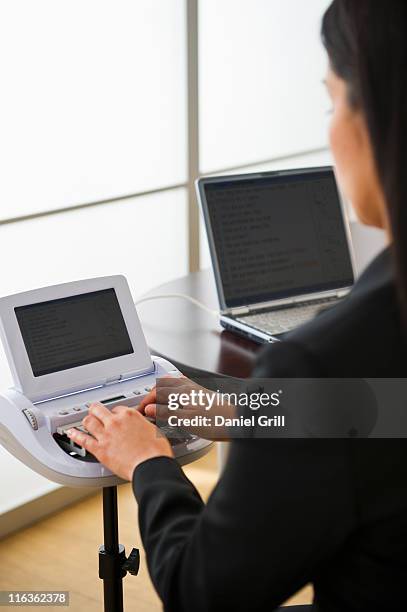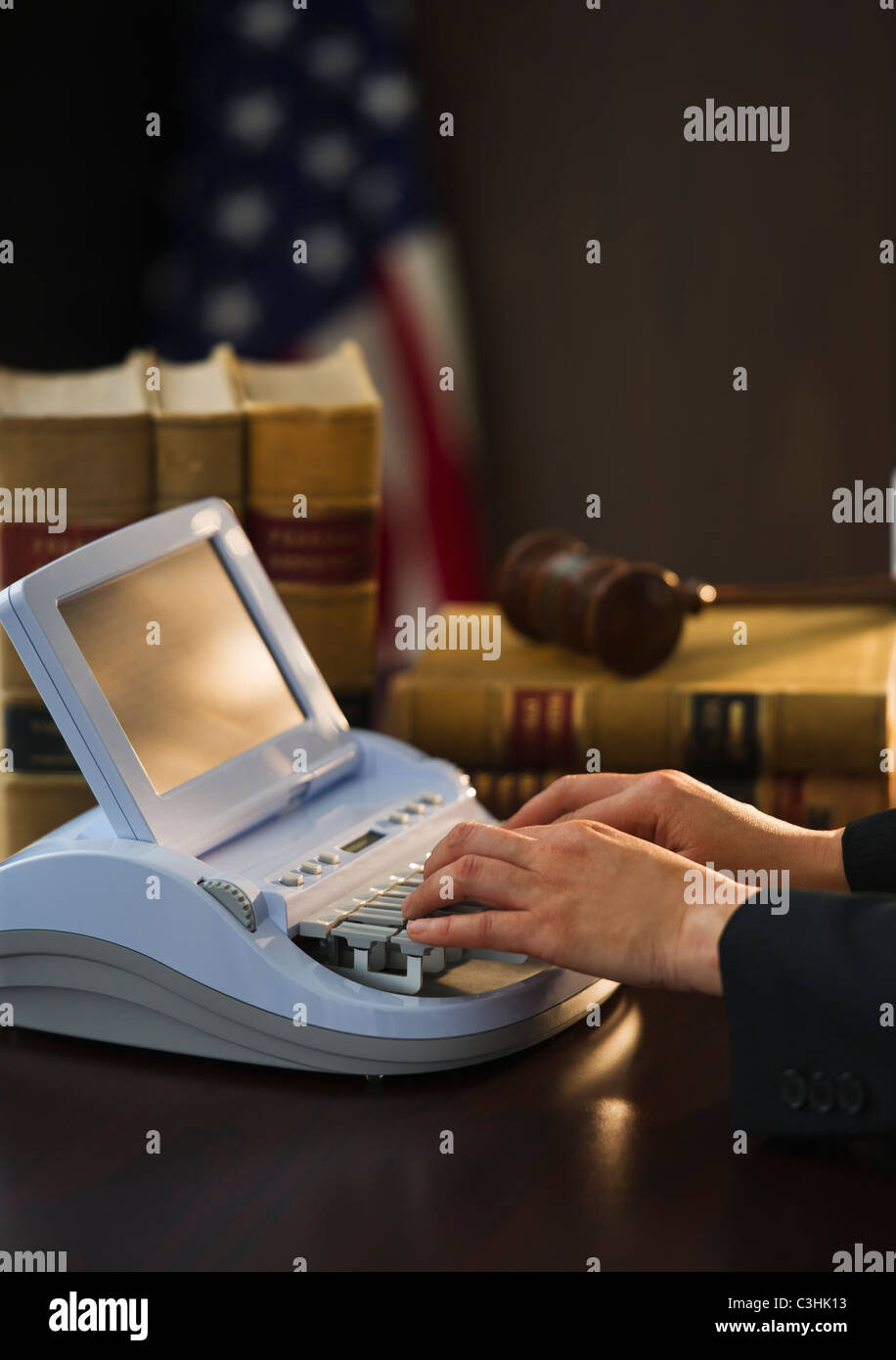How to Start a Career as a Professional Court Typist: Step-by-Step Guide
How to Start a Career as a Professional Court Typist: Step-by-Step Guide
Blog Article
Checking Out the Day-to-Day Obligations of a Court Typist in the Judicial System
As you browse the elaborate world of the judicial system, you may discover yourself interested about the role of a court typist. This setting is greater than just keying; it involves capturing every word talked throughout procedures with precision. Every day offers special obstacles and obligations that are important for preserving the stability of lawful documents. Recognizing what a court typist does can disclose insights into the broader workings of justice. What does it require to excel in this duty?
Summary of the Court Typist Function
As you tip right into the function of a court typist, you'll find it is important to recognize the vital responsibilities included. You'll act as an important web link in the judicial procedure, making certain that all talked words during court process are accurately recorded and recorded. Your work supports the honesty of the legal system, making your interest to information imperative.You'll operate customized transcription tools, transforming audio recordings into created records. Being familiar with lawful terminology and court procedures is essential, as you'll typically run into intricate language and jargon.You'll additionally require to preserve discretion and take care of delicate info with treatment. Your role requires you to work effectively under pressure, commonly with tight due dates, while remaining concentrated on producing clear, specific transcripts. As a court typist, you play an important duty in preserving the official record of court process, contributing substantially to the general functioning of the judiciary.

Trick Responsibilities of a Court Typist
While you'll often be concentrated on capturing spoken words throughout court proceedings, your key obligations as a court typist expand much past transcription. You'll prepare and maintain precise documents of court tasks, ensuring they mirror every detail of the process. You'll additionally format papers, such as legal briefs and summons, sticking to rigorous standards and deadlines.In enhancement, you'll arrange and manage case files, making it easier for judges and lawyers to gain access to essential info swiftly. You're anticipated to proofread and modify records for quality and precision, which is vital for the honesty of lawful proceedings.Moreover, you'll function carefully with judges, clerks, and attorneys, keeping open communication to attend to any type of disparities or demands. Your function is vital in making certain that the judicial process runs smoothly, supplying a reputable composed account of what takes place in the court.
Essential Abilities for Court Typists
As a court typist, you need to understand both keying rate and precision to keep up with the demands of the court. Experience with legal terminology is additionally vital, as it ensures you properly catch the process. These abilities not only boost your performance however likewise add to the total performance of the legal procedure.
Typing Speed and Precision
Entering speed and accuracy are essential abilities that every court typist need to grasp to guarantee the honesty and performance of lawful documentation. You require to type swiftly yet very carefully, as also minor errors can lead to significant misconceptions in legal contexts. A high typing rate permits you to stay on par with fast-paced court process, ensuring that every word is recorded accurately. Exercising on a regular basis can help you boost your speed, while concentrating on precision aids decrease errors. Making use of devices like dictation software application or message expanders can additionally increase your effectiveness. Keep in mind, your function is critical in maintaining exact documents, so honing these abilities not just advantages you yet additionally supports the whole judicial process.
Legal Terms Effectiveness
Mastering legal terminology is crucial for court typists to guarantee exact and reliable documents. You require to acquaint on your own with various legal phrases, lingo, and ideas frequently made use of in court procedures. This knowledge assists you transcribe recordings and draft files with accuracy. When you recognize terms like "plaintiff," "offender," and "subpoena," you'll lower the opportunities of errors that can jeopardize lawful proceedings.Additionally, exceling in lawful terms boosts your self-confidence while working along with judges, attorneys, and various other lawyers. You'll locate it easier to adhere to discussions and properly capture the essence of what's being claimed. court typist. Continual understanding and technique will enhance your skills, making you a useful asset in the judicial system
Tools and Modern Technology Used by Court Typists
As a court typist, you depend on different tools and innovation to perform your tasks effectively. You'll require crucial typing equipment, straightforward software application applications, and audio transcription tools to equal the demands of your job. Allow's check out exactly how each of these components plays an important function in your everyday tasks.
Vital Inputting Tools
While court typists rely heavily on their skills, the right tools is crucial for effectiveness and accuracy. To start with, a high-grade keyboard is important for specific and quick keying, permitting you to maintain pace with courtroom process. Ergonomic layouts can help stop pressure during lengthy sessions. A reliable computer system with enough processing power guarantees smooth procedure, particularly when handling large files (court typist). try this website You'll additionally require a great printer for producing clear duplicates of transcripts. Noise-canceling earphones can be helpful during recordings, assisting you focus on audio clearness. Additionally, a comfortable chair and a well-organized workspace promote performance. With the appropriate devices, you can improve your typing abilities and sustain the judicial process properly
Software Applications Utilized
To efficiently transcribe court procedures, you'll rely upon a variety of specialized software applications designed for precision and speed. These programs typically consist of data processing software, which helps you layout records rapidly and appropriately. You'll also make use of legal-specific software application that helps in handling case documents and preserving records, guaranteeing you can conveniently access crucial information.Another vital device is real-time transcription software, enabling you to generate transcripts as the process unfold. In addition, you could utilize paper administration systems to organize and recover documents effortlessly. With these applications, you'll enhance your performance and maintain the high standards needed in the judicial system, permitting you to focus on your typing skills and the job handy.

Sound Transcription Devices
Court typists often count on a range of audio transcription devices to boost the precision of their job. These devices help you convert spoken words right into created text efficiently. You could use software application like Dragon NaturallySpeaking or Otter.ai, which supply voice recognition capacities, enabling for fast transcription. In addition, audio playback tools allow you to pay attention to recordings repetitively, ensuring you capture every detail correctly. Some court typists likewise make use of foot pedals, letting you manage audio playback hands-free while you type. This mix of modern technology not just quickens the transcription process but also lessens errors. Acquainting yourself with these devices can considerably improve your efficiency and the high quality of your transcriptions in the hectic judicial environment.
Challenges Encountered by Court Typists
Numerous may see the duty of a court typist as simple, you'll swiftly uncover that it comes with a distinct set of obstacles. One significant obstacle is the fast lane of court process. You'll require to stay on par with fast dialogues, which can be daunting, particularly when numerous audio speakers are involved. Additionally, the lawful lingo made use of in court can be unknown and complex, requiring you to constantly discover and adapt.Another challenge is the pressure of limited due dates. You frequently need to generate transcripts rapidly, which can bring about tension and potential errors. Maintaining emphasis for lengthy durations is crucial, as also a brief gap can influence your work.Lastly, taking care of confidential info implies you should always focus on protection and discernment, including another layer of responsibility to your role. Balancing these challenges becomes essential for any individual in the setting of a court typist.
The Significance of Precision and Interest to Information
Precision and focus to detail are vital for court typists, as even small mistakes can lead to significant misconceptions in lawful proceedings. You are in charge of recording court hearings, legal papers, and various other vital details, where every word matters. A simple typo or lost spelling can alter the definition of a declaration, potentially affecting the end result of a case.When you concentrate on precision, you aid maintain the honesty of the judicial system. Your meticulous work sustains lawyers, courts, and customers by giving clear and exact documents. Interest to information likewise lessens the risk of pricey hold-ups and assurances that all events involved have accessibility to reputable documents.
Occupation Path and Opportunities for Court Typists
Mastering accuracy and attention to detail not just boosts your current duty however also opens up doors to different occupation courses for court typists. As you acquire experience, you may think about advancing to settings such as lawful secretary or management aide in regulation companies, where your skills in this transcription and record monitoring will certainly be invaluable.You could also check out opportunities in court reporting, which frequently calls for added training but provides an opportunity to engage more directly with court proceedings.If you take pleasure in the administrative side, settings in case management or legal study could be an excellent fit.With better education, you may even come to be a legal assistant, aiding legal representatives with instance preparation.Networking with lawyers can aid you discover covert opportunities.Ultimately, your structure as a court typist furnishes you with abilities that are commonly applicable across the lawful landscape, leading the way for a fulfilling career.
Often Asked Concerns

What Qualifications Are Required to Come To Be a Court Typist?
To end up being a court typist, you'll need solid inputting abilities, understanding of legal terminology, and interest to information. A senior high school diploma is commonly required, and certifications in transcription can enhance your certifications.
Just how Does a Court Typist Manage Confidential Details?
You deal with secret information by adhering to rigorous methods, utilizing protected systems, and keeping discretion. You're trained to identify sensitive data and ensure it's kept and shared only with authorized employees, safeguarding the honesty of the info.
What Is the Normal Work Atmosphere for Court Typists?
You'll generally locate court typists in an official workplace setting, often bordered by lawyers. The setting's normally quiet, concentrated, and structured, allowing you to focus on recording and managing delicate documents efficiently.
Are Court Typists Required to Take Dictation Throughout Trials?
Yes, court typists usually take dictation during tests. You'll require to pay attention meticulously, recording legal proceedings accurately and effectively. Your emphasis and rate will certainly assure that every information is captured for authorities documents.
Exactly How Do Court Typists Handle Due Dates Throughout Busy Periods?
Throughout busy durations, you focus on tasks by arranging your workload and using effective keying techniques. You set practical due dates, interact with associates, and stay focused to guarantee all records are finished accurately and in a timely manner. While you'll frequently be concentrated on recording talked words throughout court process, this post your key responsibilities as a court typist extend far past transcription. Typing speed and accuracy are essential abilities that every court typist need to grasp to ensure the honesty and efficiency of lawful paperwork. Grasping lawful terms is vital for court typists to assure reliable and precise documents. Accuracy and attention to information are vital for court typists, as also minor mistakes can lead to significant misconceptions in legal procedures. court typist. To become a court typist, you'll need strong keying skills, knowledge of lawful terms, and interest to information
Report this page